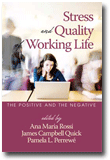
Stress and Quality of Working Life
The Positive and The Negative
Edited by:
Ana Maria Rossi, International Stress Management Association
James Campbell Quick, The University of Texas at Arlington
Pamela L. Perrewé, Florida State University
A volume in the series: Stress and Quality of Working Life. Editor(s): Ana Maria Rossi, International Stress Management Association. Charn P. McAllister, Northern Arizona University. Jeremy D. Mackey, Auburn University.
Published 2009
This book offers twelve chapters organized into three major sections that address occupational stress and quality of working life. The authors are an internationally renowned team of scholar-research-practitioners who are grounded in applied science and clinical practice. Section 1 includes five chapters that address the organizational and individual costs of occupational stress. The costs are humanitarian and economic; both human suffering and financial burdens are important. Section 2 includes three chapters that focus on ways to mitigate the negative effects of occupational stress.
We must help those who are suffering but we must do more by preventing distress where we can and building on positive, strength factors where possible. Section 3 includes four chapters that examine and expand our understanding of work life quality. Work life quality is so important because of the effects it has on workers and leaders, as well as the spillover impact into families and communities.
These twelve chapters, highlight both core knowledge and new developments within the rapidly growing field of research on stress and the quality of working life. We believe this information can help to raise awareness of the causes and costs of occupational stress and poor quality of working life. Further, this should provide a challenge, some incentive, and renewed insight for organizations in Brazil and elsewhere to begin thinking about and acting in ways that lead to a less stressful environment for their workforce.
CONTENTS
Preface. Foreword. SECTION 1: THE ORGANIZATIONAL AND INDIVIDUAL COSTS OF OCCUPATIONAL STRESS. Burnout and Workplace Injuries: A Longitudinal Analysis, Michael P. Leiter and Christina Maslach. The Impact of International Business Trips on the Travelers and Their Spouses, Mina Westman, Dalia Etzion, and Shoshi Chen. Occupational Stress and Workplace Sleepiness, Sarah DeArmond and Peter Y. Chen. The Experience of Work-Related Stress across Occupations, Sheena Johnson, Cary Cooper, Sue Cartwright, Ian Donald, Paul Taylor, and Clare Cook. Work-Related Mental Disorders: A Perspective of the Brazilian Occupational Medicine and Psychiatry, Duílio Antero de Camargo. SECTION 2: MITIGATING THE NEGATIVE EFFECTS OF OCCUPATIONAL STRESS. Leadership from a Positive Health Perspective: A Qualitative Study. Marilyn Macik-Frey, James Campbell Quick, Phillip Shinoda, David A. Mack, David A. Gray, Nathan Keller, and Cary L. Cooper. The Role of Political Skill in Neutralizing the Dysfunctional Impact of Negative Affectivity on Psychological and Physiological Strains, Kelly L. Zellars, Pamela L. Perrewé, Ana Maria Rossi, Charles J. Kacmar, Wayne A.
Hochwarter, and Gerald R. Ferris. Meditation in Health: Definition, Operationalization, and Technique, Roberto Cardoso, Eduardo de Souza, and Luiz Camano. SECTION 3: UNDERSTANDING AND EXAMINING WORK LIFE QUALITY. Biobehavioral Mediators of Stress and Quality of Life in Occupational Settings, Robert J. Gatchel and Andrew Baum. Qualitative and Quantitative Methods in Occupational-Stress Research, Irvin Sam Schonfeld and Edwin Farrell. Management of Quality of Life at Work in Healthcare Organizations, Káthia de Carvalho Cunha. Health Promotion and Quality of Work Life: The Challenge of Integrated Management, Ana Cristina Limongi-França.
-
Paperback978-1-60752-058-0
Web price: $45.04 (Reg. 52.99)
-
Hardcover978-1-60752-059-7
Web price: $80.74 (Reg. 94.99)
- eBook9781607522003

- PSY021000 - PSYCHOLOGY: Industrial & Organizational Psychology
- BUS041000 - BUSINESS & ECONOMICS: Management
- BUS030000 - BUSINESS & ECONOMICS: Human Resources & Personnel Management
-
 Coping and Prevention
Coping and Prevention
-
 Improving Employee Health and Well Being
Improving Employee Health and Well Being
-
 Stress and Quality of Working Life
Finding Meaning in Grief and Suffering
Stress and Quality of Working Life
Finding Meaning in Grief and Suffering
-
 Stress and Quality of Working Life
Coping at Work and at Home
Stress and Quality of Working Life
Coping at Work and at Home
-
 Stress and Quality of Working Life
Current Perspectives in Occupational Health
Stress and Quality of Working Life
Current Perspectives in Occupational Health
-
 Stress and Quality of Working Life
Interpersonal and Occupation‐Based Stress
Stress and Quality of Working Life
Interpersonal and Occupation‐Based Stress
-
 Stress and Quality of Working Life
Conceptualizing and Assessing Stress
Stress and Quality of Working Life
Conceptualizing and Assessing Stress

